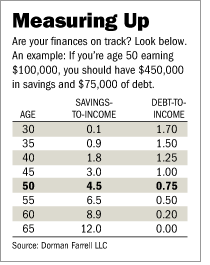amithereyet
Confused about dryer sheets
- Joined
- Jan 13, 2011
- Messages
- 1
Hey folks. New member here. I've been casually investing for about the past 3 years through 401k and a Roth IRA. I've had a decent amount of cash laying around so recently decided to put it to work in a couple mutual funds. Since that investment I've been obsessed with finances and investing which brings me here. I'm curious how I'm doing so far regarding early retirement. Here are the specifics:
I'm 28 and live in the midwest making 60k/year. I'm single and rent. My rent is slightly over 1/4 of my take home pay. I hope to retire at 55. My company has a "rule of 85" (age at retirement + years of service = 85) in order to draw a pension and I should meet that rule at age 55. I hope to live off the pension and mutual funds until I can start drawing from my Roth IRA and 401k. My current finances are:
Cash - $16,000 (my emergency fund plus a couple extra thousand)
401k - $25,000 (contributing 6% and 100% of that is being matched)
Roth - $8,000 (contributing 5k starting this year)
Mutual Funds - $5,000 (will be contributing annually starting next year. Contribution amount will be all the cash I have after Roth and 401k besides my emergency fund of 12k, probably around 5% of gross income)
Cars - $40,000 (a classic worth 30k and a daily driver worth 10k)
Total percentage of investments from gross salary is 19% (25% if you include my employers 401k match)
I am debt free and own 2 cars outright. One is for necessity and the other is for fun and possible appreciation (a 1966 mustang fastback).
So, how do you guys think I'm doing? Net worth right now is around 95k including the vehicles. I'd like to continue to rent until I can use my mutual funds to buy a house outright but I understand that will be a while, and to be honest, probably wont happen. Let's face it, I'll have to get a mortgage
I'm 28 and live in the midwest making 60k/year. I'm single and rent. My rent is slightly over 1/4 of my take home pay. I hope to retire at 55. My company has a "rule of 85" (age at retirement + years of service = 85) in order to draw a pension and I should meet that rule at age 55. I hope to live off the pension and mutual funds until I can start drawing from my Roth IRA and 401k. My current finances are:
Cash - $16,000 (my emergency fund plus a couple extra thousand)
401k - $25,000 (contributing 6% and 100% of that is being matched)
Roth - $8,000 (contributing 5k starting this year)
Mutual Funds - $5,000 (will be contributing annually starting next year. Contribution amount will be all the cash I have after Roth and 401k besides my emergency fund of 12k, probably around 5% of gross income)
Cars - $40,000 (a classic worth 30k and a daily driver worth 10k)
Total percentage of investments from gross salary is 19% (25% if you include my employers 401k match)
I am debt free and own 2 cars outright. One is for necessity and the other is for fun and possible appreciation (a 1966 mustang fastback).
So, how do you guys think I'm doing? Net worth right now is around 95k including the vehicles. I'd like to continue to rent until I can use my mutual funds to buy a house outright but I understand that will be a while, and to be honest, probably wont happen. Let's face it, I'll have to get a mortgage


